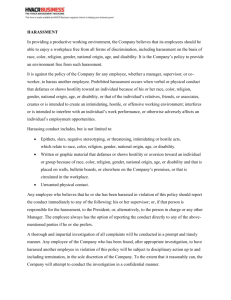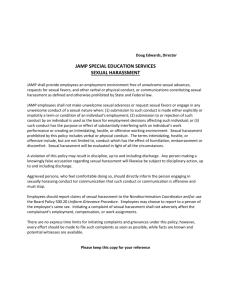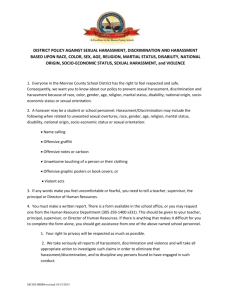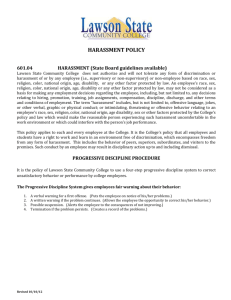Sexual Harassment Policy
advertisement
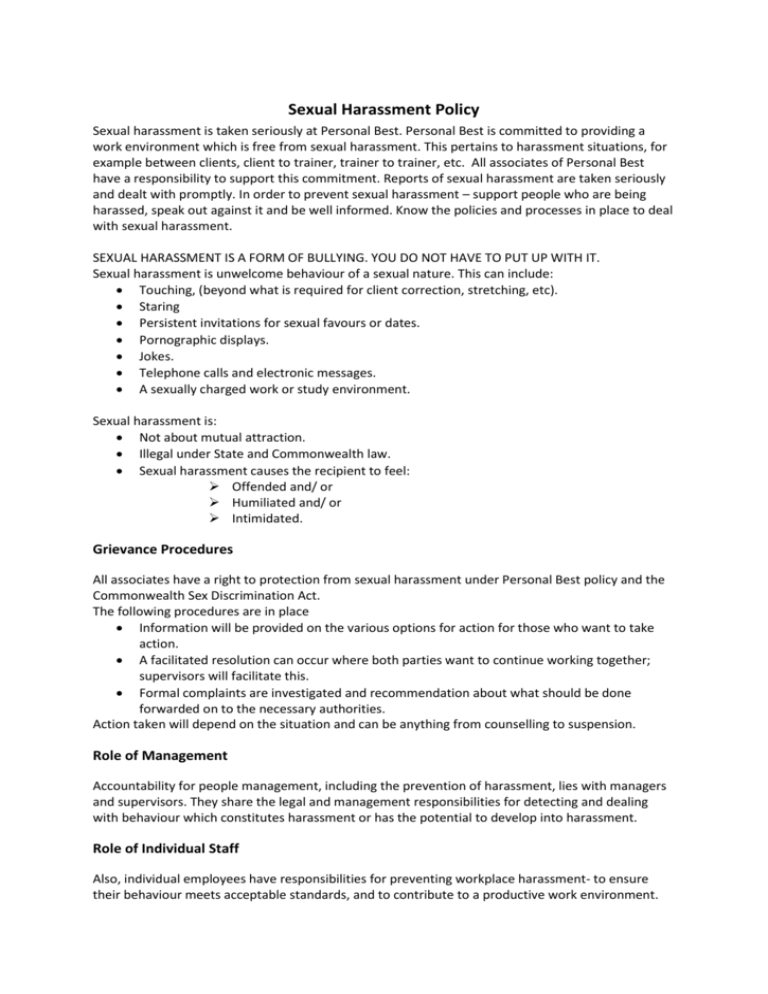
Sexual Harassment Policy Sexual harassment is taken seriously at Personal Best. Personal Best is committed to providing a work environment which is free from sexual harassment. This pertains to harassment situations, for example between clients, client to trainer, trainer to trainer, etc. All associates of Personal Best have a responsibility to support this commitment. Reports of sexual harassment are taken seriously and dealt with promptly. In order to prevent sexual harassment – support people who are being harassed, speak out against it and be well informed. Know the policies and processes in place to deal with sexual harassment. SEXUAL HARASSMENT IS A FORM OF BULLYING. YOU DO NOT HAVE TO PUT UP WITH IT. Sexual harassment is unwelcome behaviour of a sexual nature. This can include: Touching, (beyond what is required for client correction, stretching, etc). Staring Persistent invitations for sexual favours or dates. Pornographic displays. Jokes. Telephone calls and electronic messages. A sexually charged work or study environment. Sexual harassment is: Not about mutual attraction. Illegal under State and Commonwealth law. Sexual harassment causes the recipient to feel: Offended and/ or Humiliated and/ or Intimidated. Grievance Procedures All associates have a right to protection from sexual harassment under Personal Best policy and the Commonwealth Sex Discrimination Act. The following procedures are in place Information will be provided on the various options for action for those who want to take action. A facilitated resolution can occur where both parties want to continue working together; supervisors will facilitate this. Formal complaints are investigated and recommendation about what should be done forwarded on to the necessary authorities. Action taken will depend on the situation and can be anything from counselling to suspension. Role of Management Accountability for people management, including the prevention of harassment, lies with managers and supervisors. They share the legal and management responsibilities for detecting and dealing with behaviour which constitutes harassment or has the potential to develop into harassment. Role of Individual Staff Also, individual employees have responsibilities for preventing workplace harassment- to ensure their behaviour meets acceptable standards, and to contribute to a productive work environment. Support for a staff member who is the subject of workplace harassment may include providing information about grievance procedures. At other times it may be appropriate to approach management on behalf of the staff person, with their agreement. Sexual Harassment Policy (cont) Criminal Law There may be instances where harassment amounts to an offence under criminal law. Sexual harassment involving physical or indecent assault, stalking, the sending of obscene material, and the making of nuisance phone calls, for example, may be offences under criminal law. All offences under the criminal law will be reported to the police. What to do: There are various options. These are: Complainant approaches alleged harasser to resolve the complaint; Talk to the person or write to them. Let them know that you don’t like their behaviour. Complainant lodges a formal complaint with Personal Best. Complainant lodges a complaint with an external agency. Policy Statement Do you sexually harass others? Sexual harassment may be unintended. If you are not sure about your behaviour you can: Check it out by asking if it is offensive or inappropriate. Stop it. Apologise. Talk it over with a manager. Remember that you may not intend to harass or offend someone else but that doesn’t mean that they don’t feel harassed or upset. Unless we know someone really well, we cannot assume we know what they will find acceptable. Something one person finds fun or funny another may find humiliating or offensive. What makes such a big difference? Cultural background, family background, religious or moral beliefs and level of self-esteem, are all things which can influence how people act. Because we live and work increasingly in international communities, it is important to behave in ways that are least likely to offend and most likely to ensure we get on well with colleagues and clients.





